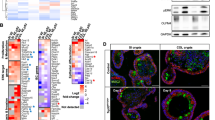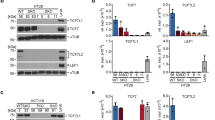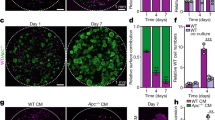Abstract
Chk1 is essential in maintaining genomic stability due to its role in cell cycle regulation. Several recent studies have indicated that the abrogation of checkpoints in tumourigenesis through the inhibition of Chk1 may be of therapeutic value. To further investigate the role of Chk1 in the mouse small intestine and its potential role as a therapy for colorectal cancer, we simultaneously deleted Chk1 and Apc in the mouse small intestine. We found that homozygous loss of Chk1 is not compatible with Wnt-driven proliferation and resulted in the suppression of Wnt-driven tumourigenesis in the mouse small intestine. In contrast, heterozygous loss of Chk1 in a Wnt-driven background resulted in an increase in DNA damage and apoptosis and accelerated both tumour development and progression.
This is a preview of subscription content, access via your institution
Access options
Subscribe to this journal
Receive 50 print issues and online access
$259.00 per year
only $5.18 per issue
Buy this article
- Purchase on Springer Link
- Instant access to full article PDF
Prices may be subject to local taxes which are calculated during checkout





Similar content being viewed by others
References
Grady WM . Genomic instability and colon cancer. Cancer Metastasis Rev 2004; 23: 11–27.
Söreide K, Janssen E, Söiland H, Körner H, Baak J . Microsatellite instability in colorectal cancer. Br J Surg 2006; 93: 395–406.
Venkatesha VA, Parsels LA, Parsels JD, Zhao L, Zabludoff SD, Simeone DM et al. Sensitization of pancreatic cancer stem cells to gemcitabine by Chk1 inhibition. Neoplasia 2012; 14: 519–525.
Montano R, Chung I, Garner KM, Parry D, Eastman A . Preclinical development of the novel Chk1 inhibitor SCH900776 in combination with DNA-damaging agents and antimetabolites. Mol Cancer Ther 2012; 11: 427–438.
Plummer R . Poly(ADP-ribose) polymerase inhibition: a new direction for BRCA and triple-negative breast cancer? Breast Cancer Res 2011; 13: 218.
Ma CX, Janetka JW, Piwnica-Worms H . Death by releasing the breaks: CHK1 inhibitors as cancer therapeutics. Trends Mol Med 2011; 17: 88–96.
Bartek J, Mistrik M, Bartkova J . Thresholds of replication stress signaling in cancer development and treatment. Nat Struct Mol Biol 2012; 19: 5–7.
Bartkova J, Horejsí Z, Koed K, Krämer A, Tort F, Zieger K et al. DNA damage response as a candidate anti-cancer barrier in early human tumorigenesis. Nature 2005; 434: 864–870.
Bartek J, Lukas J, Bartkova J . DNA damage response as an anti-cancer barrier: damage threshold and the concept of 'conditional haploinsufficiency'. Cell Cycle 2007; 6: 2344–2347.
Bartek J, Lukas J . Chk1 and Chk2 kinases in checkpoint control and cancer. Cancer Cell 2003; 3: 421–429.
Murga M, Campaner S, Lopez-Contreras AJ, Toledo LI, Soria R, Montaña MF et al. Exploiting oncogene-induced replicative stress for the selective killing of Myc-driven tumors. Nat Struct Mol Biol 2011; 18: 1331–1335.
Liu Q, Guntuku S, Cui XS, Matsuoka S, Cortez D, Tamai K et al. Chk1 is an essential kinase that is regulated by Atr and required for the G(2)/M DNA damage checkpoint. Genes Dev 2000; 14: 1448–1459.
Lam MH, Liu Q, Elledge SJ, Rosen JM . Chk1 is haploinsufficient for multiple functions critical to tumor suppression. Cancer Cell 2004; 6: 45–59.
Greenow KR, Clarke AR, Jones RH . Chk1 deficiency in the mouse small intestine results in p53-independent crypt death and subsequent intestinal compensation. Oncogene 2009; 28: 1443–1453.
Zaugg K, Su YW, Reilly PT, Moolani Y, Cheung CC, Hakem R et al. Cross-talk between Chk1 and Chk2 in double-mutant thymocytes. Proc Natl Acad Sci USA 2007; 104: 3805–3810.
Fishler T, Li YY, Wang RH, Kim HS, Sengupta K, Vassilopoulos A et al. Genetic instability and mammary tumor formation in mice carrying mammary-specific disruption of Chk1 and p53. Oncogene 2010; 29: 4007–4017.
Tho LM, Libertini S, Rampling R, Sansom O, Gillespie DA . Chk1 is essential for chemical carcinogen-induced mouse skin tumorigenesis. Oncogene 2012; 31: 1366–1375.
Sansom O, Reed K, Hayes A, Ireland H, Brinkmann H, Newton I et al. Loss of Apc in vivo immediately perturbs Wnt signaling, differentiation, and migration. Genes Dev 2004; 18: 1385–1390.
Shibata H, Toyama K, Shioya H, Ito M, Hirota M, Hasegawa S et al. Rapid colorectal adenoma formation initiated by conditional targeting of the Apc gene. Science 1997; 278: 120–123.
Ireland H, Kemp R, Houghton C, Howard L, Clarke AR, Sansom OJ et al. Inducible Cre-mediated control of gene expression in the murine gastrointestinal tract: effect of loss of beta-catenin. Gastroenterology 2004; 126: 1236–1246.
Sansom OJ, Reed KR, Hayes AJ, Ireland H, Brinkmann H, Newton IP et al. Loss of Apc in vivo immediately perturbs Wnt signaling, differentiation, and migration. Genes Dev 2004; 18: 1385–1390.
Merritt AJ, Allen TD, Potten CS, Hickman JA . Apoptosis in small intestinal epithelial from p53-null mice: evidence for a delayed, p53-independent G2/M-associated cell death after gamma-irradiation. Oncogene 1997; 14: 2759–2766.
Bakkenist CJ, Kastan MB . DNA damage activates ATM through intermolecular autophosphorylation and dimer dissociation. Nature 2003; 421: 499–506.
Rogakou EP, Nieves-Neira W, Boon C, Pommier Y, Bonner WM . Initiation of DNA fragmentation during apoptosis induces phosphorylation of H2AX histone at serine 139. J Biol Chem 2000; 275: 9390–9395.
Bolderson E, Richard DJ, Zhou BB, Khanna KK . Recent advances in cancer therapy targeting proteins involved in DNA double-strand break repair. Clin Cancer Res 2009; 15: 6314–6320.
Salhab N, Jones DJ, Bos JL, Kinsella A, Schofield PF . Detection of ras gene alterations and ras proteins in colorectal cancer. Dis Colon Rectum 1989; 32: 659–664.
Soriano P . Generalized lacZ expression with the ROSA26 Cre reporter strain. Nat Genet 1999; 21: 70–71.
Bjerknes M, Cheng H . Methods for the isolation of intact epithelium from the mouse intestine. Anat Rec 1981; 199: 565–574.
Acknowledgements
This work was supported by Cancer Research UK. Particular thanks go to Mark Bishop, Lucie Pietzka and Derek Scarborough for technical assistance. The authors declare no conflicts of interest.
Author information
Authors and Affiliations
Corresponding author
Ethics declarations
Competing interests
The authors declare no conflict of interest.
Additional information
Supplementary Information accompanies this paper on the Oncogene website
Rights and permissions
About this article
Cite this article
Greenow, K., Clarke, A., Williams, G. et al. Wnt-driven intestinal tumourigenesis is suppressed by Chk1 deficiency but enhanced by conditional haploinsufficiency. Oncogene 33, 4089–4096 (2014). https://doi.org/10.1038/onc.2013.371
Received:
Revised:
Accepted:
Published:
Issue Date:
DOI: https://doi.org/10.1038/onc.2013.371
Keywords
This article is cited by
-
Checkpoint kinase 1 is essential for normal B cell development and lymphomagenesis
Nature Communications (2017)



